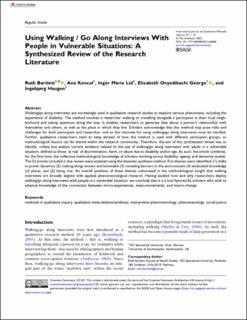| dc.contributor.author | Bartlett, Ruth | |
| dc.contributor.author | Koncul, Ana | |
| dc.contributor.author | Lid, Inger Marie | |
| dc.contributor.author | George, Elizabeth Onyedikachi | |
| dc.contributor.author | Haugen, Ingebjørg | |
| dc.date.accessioned | 2024-04-11T12:40:25Z | |
| dc.date.available | 2024-04-11T12:40:25Z | |
| dc.date.created | 2023-02-24T12:42:03Z | |
| dc.date.issued | 2023 | |
| dc.identifier.citation | International Journal of Qualitative Methods (IJQM). 2023, 22 (January/December), | en_US |
| dc.identifier.issn | 1609-4069 | |
| dc.identifier.uri | https://hdl.handle.net/11250/3126125 | |
| dc.description.abstract | Walking/go along interviews are increasingly used in qualitative research studies to explore various phenomena, including the experience of disability. The method involves a researcher walking or travelling alongside a participant in their local neighborhood and asking questions along the way. It enables researchers to generate data about a person’s relationship with themselves and others, as well as the place in which they live. Scholars acknowledge that this method may pose risks and challenges for both participant and researcher, and so the rationale for using walking/go along interviews must be clarified. Further, qualitative researchers need to keep abreast of how the method is used with different participant groups, so methodological lessons can be shared within the research community. Therefore, the aim of this synthesized review was to identify, collate and analyse current evidence related to the use of walking/go along interviews with adults in a vulnerable situation, defined as those ‘at risk’ of discrimination, harm, or abuse due to disability and/or age. As such, the article combines, for the first time, the collective methodological knowledge of scholars working across disability, ageing, and dementia studies. The 23 articles included in the review were analyzed using the thematic synthesis method. Five themes were identified; (1) shifts in power dynamics (2) making things known and knowable (3) revealing barriers in the environment (4) embodied knowledge (of place), and (5) being one. An overall synthesis of these themes culminated in the methodological insight that walking interviews are broadly aligned with applied phenomenological research. Having studied how and why researchers deploy walking/go along interviews with people in a vulnerable situation, we conclude that it is a tool favored by scholars who wish to advance knowledge of the connection between micro-experiences, meso-movements, and macro-change. | en_US |
| dc.language.iso | eng | en_US |
| dc.publisher | Sage Publications | en_US |
| dc.rights | Navngivelse 4.0 Internasjonal | * |
| dc.rights.uri | http://creativecommons.org/licenses/by/4.0/deed.no | * |
| dc.subject | social justice | en_US |
| dc.subject | phenomenology | en_US |
| dc.subject | interpretive phenomenology | en_US |
| dc.subject | qualitative meta-analysis/synthesis | en_US |
| dc.subject | methods in qualitative inquiry | en_US |
| dc.title | Using walking / go along interviews with people in vulnerable situations: A synthesized review of the research literature | en_US |
| dc.type | Peer reviewed | en_US |
| dc.type | Journal article | en_US |
| dc.description.version | publishedVersion | en_US |
| dc.rights.holder | © The Author(s) 2023 | en_US |
| dc.source.volume | 22 | en_US |
| dc.source.journal | International Journal of Qualitative Methods (IJQM) | en_US |
| dc.source.issue | January/December | en_US |
| dc.identifier.doi | 10.1177/16094069231164606 | |
| dc.identifier.cristin | 2128954 | |
| cristin.ispublished | true | |
| cristin.fulltext | original | |
| cristin.qualitycode | 2 | |

